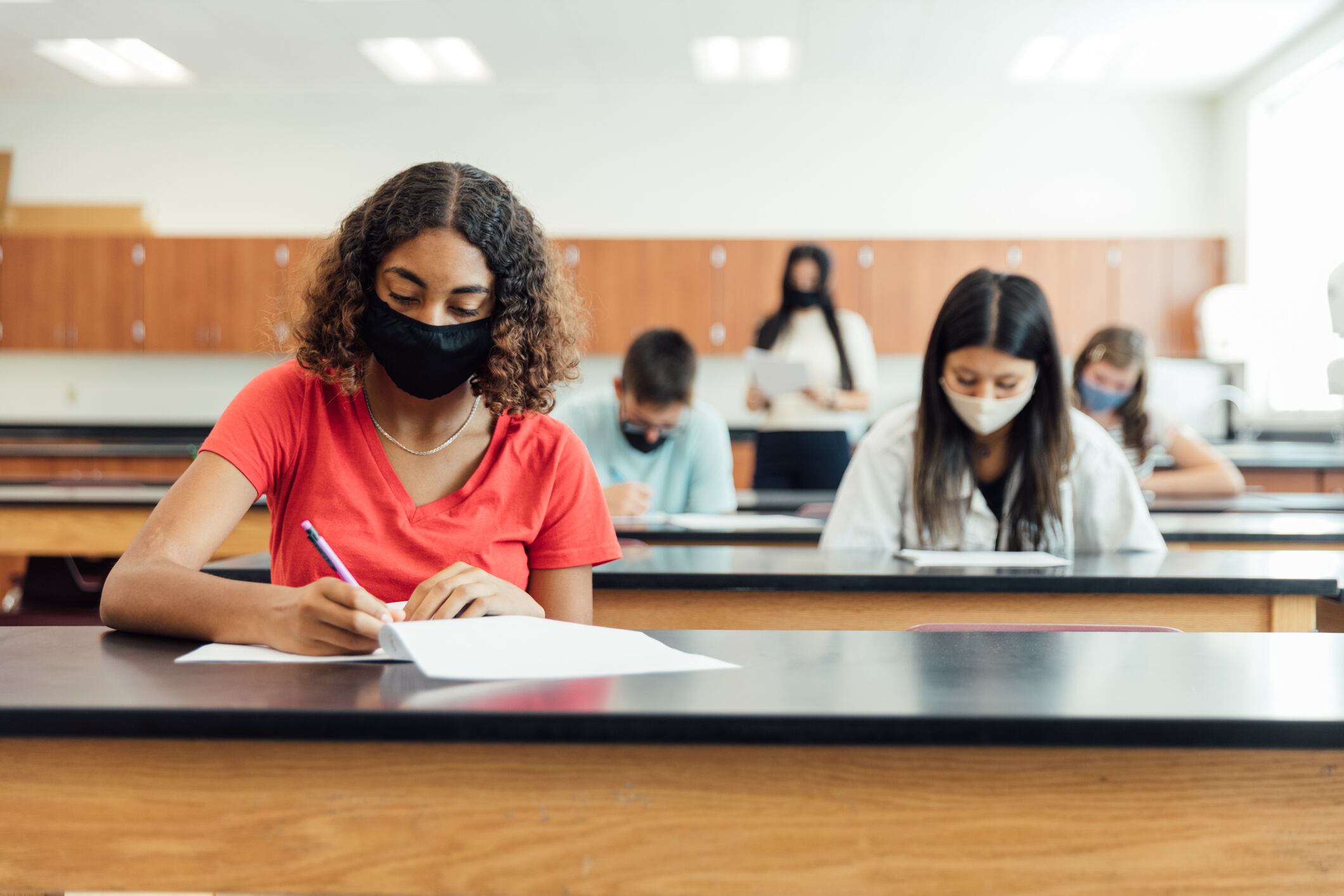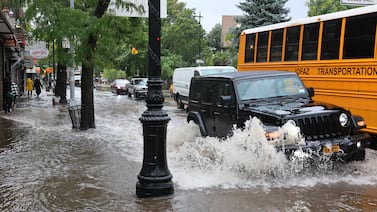Some Chicago students are slated to return to their shuttered high schools for the first time since March next week to take the SAT, a college entrance exam that the state of Illinois requires for graduation.
Some parents and educators are pushing back, questioning whether sticking with this requirement amid the pandemic is worth the health risks of in-person testing. They point out that most colleges and universities across the country have at least temporarily moved away from requiring the test for admissions this fall.
“You cannot educate (my child) in person, but you can test her in person,” said Monica Lasky, whose daughter is a senior at Jones High School. “That doesn’t make sense to me.”
One statewide parent group says it might take this argument to the state school board and advocate for making the test optional for this year’s seniors. In Chicago, some students and others say some campuses have not communicated staffing and safety protocols clearly enough ahead of test dates next week and in October.
Chicago district officials say the SAT remains a key part of college applications for many students, and giving seniors the option to take it this fall is “critically important.” They said schools are taking extensive safety precautions — and students can choose to wait to sit for the exam next spring.
“The district must continue to keep students on a positive academic trajectory and ensure they have the same postsecondary opportunities as their peers across the country,” the district said in a statement.
The debate in Illinois is playing out as some experts are predicting that the pandemic — in tandem with a national reckoning over race that has fueled long-standing questions about test bias — could spell the demise of standardized college admissions tests such as the SAT and ACT. Two-thirds of four-year U.S. higher education institutions are making such tests optional for the upcoming admissions cycle, according to the advocacy group FairTest.
Relief, and anxiety
Cassius Palacio, a senior at Brooks College Prep on the city’s South Side, found out on the first day of the school year that Brooks would offer the SAT on Sept. 23. At first, he felt relief.
During summer break, he had tried to take the test three times, in one case signing up to travel to the closest available testing site — more than an hour away in Indiana. Each time, the test was called off a day or two earlier — the kind of last-minute cancellations that have plagued students across the country during the pandemic. All the higher education institutions Palacio is eyeing are test optional at least this year, but he feels a strong SAT score would give his application a boost.
Then, anxiety kicked in.
“That date was only two weeks away,” Palacio said. “Many of us were really stressing out about it.”
He also wondered what safety precautions the school would take; he worries about his elderly grandmother, who lives with his family. He found out this week the school would offer a second opportunity to take the SAT in October, and he signed up for that.
The district said its schools can choose to offer the test on Sept. 23 and three other dates in October. For seniors who don’t take the SAT this fall, there will be additional testing in January and April. Officials said the September date qualifies seniors for the National Merit Scholarship Program; they argued the SAT remains “one of the single most important data points schools consider when determining eligibility.” (Chicago will also offer juniors a chance to take the PSAT, a practice version of the test, this fall — an option that, unlike the SAT for seniors, is not funded by the state.)
The list of safety precautions schools will take includes deep cleaning rooms before and after testing and requiring an online health screening, a temperature check, hand washing or sanitizing, face coverings, and social distancing. Desks will be spaced at six feet apart.
Some parents and others say they don’t object to giving students the chance to take the test but rather to the state’s decision to keep it mandatory.
Lasky’s daughter, the Jones senior, took the SAT last winter and earned a high score. So Lasky was frustrated to hear her daughter would need to take the test again. Under state guidelines, only these in-school SAT exams allow students to meet the graduation requirement — not tests they might have taken previously elsewhere.
Lasky said she appreciates giving students who need the test the opportunity to take it this fall, and she trusts the school to take safety seriously. Still, this seems like an unjustifiable health risk at a time the school district and city health officials have determined in-person learning is not a safe option.
“Yet it’s safe for her to ride a subway downtown and sit in a building for four hours to take a test she’s already taken and done really well on?” Lasky said. “It just seems like bureaucratic silliness to me.”
She added the testing will likely add stress to students’ lives at an already challenging time for teens.
Schools are asking teachers and other staff to volunteer to proctor the exams. Some campuses, such as Jones, have recently asked for parent volunteers to staff the test.
In the absence of clear district-issued communication, some high schools have been tardy in giving students a heads up about the upcoming dates and have not clearly communicated how they will ensure safety or who will oversee the testing, said one Chicago high school counselor, who requested anonymity so as not to antagonize his school’s administration. He said he is not opposed to offering the test for students who would like to take it.
“But this should be done with plenty of advance notice and plenty of information about the safety arrangements,” he said. “The notion of assembling our students together in small spaces indoors for hours at a time is unlikely to be conducive to proper public health.”
A pandemic mandate
Chicago and other districts do not have the option of scrapping the fall testing dates. The state requires all public schools to offer the SAT on at least one of the dates and strongly recommends that it holds testing in both September and October.
Under normal circumstances, this fall’s seniors would have taken the SAT at school during their junior year, but last year’s exams were canceled because of the coronavirus outbreak and in Chicago during the teachers strike earlier in the school year. Now, the state’s board of education wants seniors to take the test. The state has stressed the results will not be used to hold schools and districts accountable this school year.
A spokesman for the state board noted that districts can secure waivers for students who are unable to take the test this school year.
Cassie Creswell, of the advocacy group Illinois Families for Public Schools, said her organization is considering taking aim at the SAT requirement. She noted the state is under no federal mandate currently to administer the test to students, and given the budgetary challenges it faces, the concerns in-person testing raises do not seem justified.
“Our entire society is going through something catastrophic, and to be spending any time on high-stakes testing right now is not what schools should be doing,” she said.
While some colleges and universities have said they will revisit the question of requiring the SAT or ACT after the pandemic subsides, some have made the tests optional permanently — joining a movement away from mandating the tests that has gained momentum in recent years. The University of Chicago, for instance, made that move in 2018. A small but growing number of institutions are also becoming “test-blind,” meaning they disregard scores on these tests even if students submit them.
Critics of these tests have pointed to consistent racial disparities in student scores, arguing that those without the means to pay for test prep and those who attend under-resourced high schools are placed at a disadvantage. But some advocates for the exams counter that they give students without access to advanced courses in high school and those whose GPAs might have suffered because of, say, homelessness or other disruption a chance to strengthen their applications.
At Chicago’s Amundsen High, more than two-thirds of students have opted to take the test this fall, and enough employees have volunteered to proctor, school leaders said.
Yuliza Soto, a senior at Prosser High School in northwest Chicago, said she and other students expected the state would back off from the SAT requirement this year after testing was canceled last spring. She helps two younger siblings with remote learning, and she said coming in to take the test on a school day can be complicated for students who juggle jobs or childcare responsibilities.
But she said she plans to take the test in October to “get it over with.” Though colleges she’s eyeing don’t require the test, she plans to submit her score if she is happy with it. And that list of precautions her school shared helped reassure her.
“It’s not perfect,” she said, “but the school is trying to make sure we are pretty safe.”







